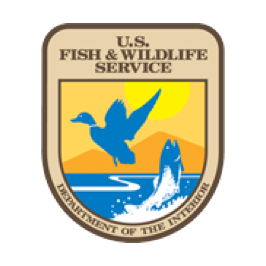Service Awards More Than $5.9 Million in Tribal Wildlife Grants to Advance Shared Conservation Goals and Support Natural Heritage, Cultural Priorities
Awards will support 33 Tribes across 16 states, bolstering fish and wildlife conservation
October 20, 2022
U.S. Fish & Wildlife Service
Contact: [email protected], 862-926-7604
Download Press Release
The U.S. Fish and Wildlife Service is awarding more than $5.9 million to federally recognized Native American and Alaska Native Tribes to benefit fish and wildlife resources and their habitats. The Tribal Wildlife Grants Program helps to fulfill federal trust responsibilities and achieve tribal sovereignty by expanding Tribes’ natural resource capacity. This year’s funding will support 33 Tribes in conservation projects across 16 states, benefiting a wide range of wildlife and habitat, including species of cultural or traditional importance to Indigenous communities.
“Our success in achieving shared conservation goals depends on our relationships, knowledge-sharing and co-stewardship with federally recognized Tribes,” said Service Director Martha Williams. “By respecting and supporting Tribal interests and needs, we can improve and enhance fish, wildlife, and natural and cultural resources for the benefit of all – a main pillar of the America the Beautiful initiative.”
The Biden-Harris administration’s America the Beautiful initiative is a locally led, voluntary conservation and restoration effort that aims to address the nature and climate crises, improve equitable access to the outdoors and strengthen the economy. This effort calls upon local, state, and federal leaders to honor Tribal sovereignty and support the priorities of Tribal nations when making decisions related to sustainable land management and the conservation of natural, cultural and historical resources.
The Service recognizes the need for strong, healthy communication and relationships with Tribal governments and communities so we can work together to improve and enhance our conservation mission. Since its inception in 2003, including this year’s grants, the competitive Tribal Wildlife Grants Program has awarded more than $111.6 million to Native American and Alaska Native Tribes, providing support for 626 conservation projects.
The grants have enabled Tribes to develop increased management capacity, improve and enhance relationships with conservation state partners, address cultural and environmental priorities, and help train the next generation of conservationists by engaging Tribal students interested in fisheries, wildlife and related fields of study. Some grants have been awarded to support recovery efforts for federally listed threatened and endangered species.
Examples of projects approved this year include:
Qawalangin Tribe of Unalaska, within Alaska (Develop a Restoration Plan and Pilot Study for Blue Mussel Habitat in Unalaska Bay: A Natural Resources Conservation Plan) – $198,716 to develop a plan to restore the blue mussel habitat within Unalaska Bay to increase food security, reduce paralytic shellfish poisoning, and improve water quality and aquatic ecosystem health.
Round Valley Indian Tribes, within California (Anadromous Fisheries Sonar Monitoring on the Middle Fork of the Eel River by the Round Valley Indian Tribes) – $197,101 to establish a fisheries monitoring station on the Middle Fork Eel River, building fisheries recovery capacity.
Houlton Band of Maliseet Indians, within Maine (Aquatic Habitat Restoration Program: Phase VI – Continuing Instream Restoration) – $116,698 to improve opportunities for sustenance fishing by improving fish habitat along the Meduxnekeag River and increase awareness of watershed restoration. This grant builds on previous funding for the project.
Pokagon Band of Potawatomi Indians, within Michigan and Indiana (Lepidopteran and Floral Diversity Surveys in Tallgrass Prairie Habitats on Tribal Land) – $199,000 to conduct vegetative and butterfly surveys across 750 acres of restored tallgrass prairie, with a focus on culturally important and federally listed butterfly species.
Eastern Band of Cherokee Indians, within North Carolina (Evaluating the Success of Non-invasive Methods for the Management and Restoration of Cherokee Natural Resources) – $200,000 to collect information about abundance, distribution, and habitat use of protected and culturally significant and invasive species, informing management and restoration of wildlife and aquatic resources.
Choctaw Nation, within Oklahoma (Choctaw Nation Wildlife Conservation Management Plan) – $200,000 to develop a management plan to manage white-tailed deer and support consultation with federal, state, local and tribal communities.
Confederated Tribes of Coos, Lower Umpqua and Siuslaw Indians, within Oregon (Tribal Conservation and Management Plan Development Project) – $198,423 to provide a framework for managing Tribal forest lands that incorporate science driven management principles and traditional ecological knowledge in managing sensitive fish and wildlife species.
Cheyenne River Sioux Tribe, within South Dakota (Cheyenne River Sioux Tribe Black-footed Ferret Recovery Project) – $196,546 to enhance an ongoing Black-Footed Ferret recovery project leading to a permanent self-sustaining population on the Cheyenne River Reservation.
The grants are provided exclusively to federally recognized Native American and Alaska Native Tribal governments and are made possible under the Related Agencies Appropriations Act of 2002 through the State and Tribal Wildlife Grants program. To learn more about the grant program and application process, please visit: https://www.fws.gov/nativeamerican/grants.html.
For additional information about the Service’s Native American Programs, visit: https://www.fws.gov/nativeamerican/.
The U.S. Fish and Wildlife Service works with others to conserve, protect and enhance fish, wildlife, plants and their habitats for the continuing benefit of the American people. For more information, visit www.fws.gov and connect with us on social media: Facebook, Instagram, Twitter, LinkedIn, Flickr, and YouTube.






